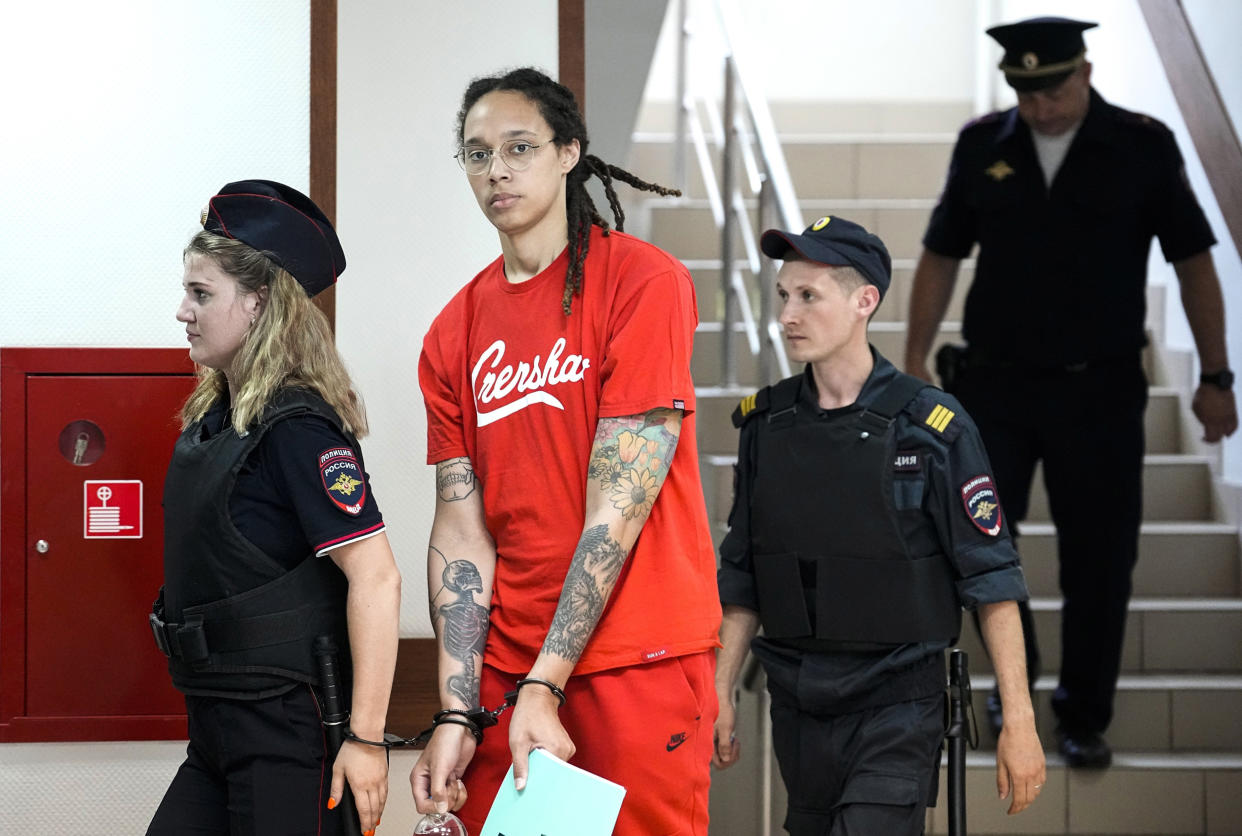Brittney Griner back in Russian court as calls grow for U.S. to secure WNBA star’s release
American basketball star Brittney Griner was back in a Moscow court Thursday as her family and friends stepped up their calls for the U.S. government to do more to free her.
The WNBA player’s trial on drug charges began last week and is expected to continue beyond Thursday.
Her latest appearance comes after President Joe Biden sought to reassure Griner’s wife that he was working to secure her release as fast as he could. Griner penned an emotional letter to the president earlier this week, pleading with him to bring her home.
Griner entered the court on Thursday wearing glasses, a red t-shirt and red pants. She was led into the courtroom in handcuffs before being placed in a white metal cage. Griner was later joined in the courtroom by three U.S. embassy representatives and her lawyers, with no TV cameras and only a few journalists allowed in.
Griner, 31, was detained in February at Moscow’s Sheremetyevo Airport after Russian authorities said they found vape canisters with cannabis oil in her luggage. She could face up to 10 years in prison if convicted on drug smuggling charges under the Russian law.

Her arrest took place just days before Russia launched its invasion of Ukraine, and has highlighted the frayed relations between Washington and Moscow.
The Kremlin has been accused of using Griner as a political pawn while the Biden administration has said she has been “wrongfully detained.” Kremlin spokesman Dmitry Peskov has denied Griner was being held as a hostage in Russia.
The trial for Griner, a 6-foot-9 native of Houston, two-time Olympic gold medalist and a center for the Phoenix Mercury, began last Friday when the court questioned two prosecution witnesses.
Griner, who plays for a Russian basketball team during the WNBA’s offseason, has made no public statements since her detention and it’s unclear what she makes of the accusations against her or what she says were the circumstances surrounding her arrest.
Since her trial started, her family, friends and colleagues have increased their calls for the U.S. to do more to bring her home.
Her team held a rally in her support in Phoenix on Wednesday while Rev. Al Sharpton urged Biden and Secretary of State Antony Blinken on Tuesday to arrange for him and a group of faith leaders to meet Griner in Russia.
The White House said Biden and Vice President Kamala Harris called Griner’s wife, Cherelle Griner, on Wednesday to assure her that he is working to secure Griner’s release as soon as possible. He also read her a draft of the letter he was sending Griner on Wednesday, according to the White House readout of the call.
It came after Griner said in the handwritten letter addressed to Biden earlier this week that she was terrified she could be in Russian jail forever, imploring him to do all he can to bring her home.
In May, the State Department reclassified Griner as having been “wrongfully detained” and transferred oversight of her case to the State Department presidential envoy for hostage affairs.
U.S. officials have said they are working behind the scenes to free her.
So far, Washington has not officially commented on any possible prisoner swaps, despite speculation in Russian state media in May that Griner could be exchanged for convicted Russian arms dealer Viktor Bout, who is serving a 25-year prison sentence in the U.S. NBC News wasn’t able to confirm those reports.
There are also growing questions over whether Griner could be traded along with Paul Whelan, another American serving a 16-year sentence for espionage.
On Wednesday, Russian Foreign Ministry deputy spokesman Alexey Zaitsev said Griner was arrested for “a serious offense, confirmed by indisputable evidence.” But he said she is free to file an appeal and to ask for clemency. As to the possible prisoner exchange, he said the court would have to reach a verdict first, which he estimated could take at least a month.
The Russian state news agency Tass cited the foreign ministry Thursday as saying that “publicity and hype” in the media and online around Americans detained in Russia impede the interaction between Moscow and the U.S. on prisoner exchanges.
This story first appeared on NBCNews.com.
Related:
